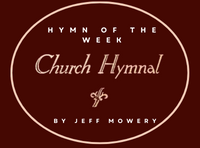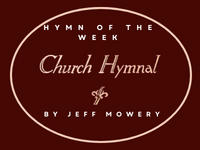To God Be The Glory
To God be the glory, great things He has done;
So loved He the world that He gave us His Son,
Who yielded His life an atonement for sin,
And opened the Lifegate that all may go in.
Chorus
Praise the Lord, praise the Lord,
Let the earth hear His voice!
Praise the Lord, praise the Lord,
Let the people rejoice!
O come to the Father, through Jesus the Son,
And give Him the glory, great things He has done.
O perfect redemption, the purchase of blood,
To every believer the promise of God;
The vilest offender who truly believes,
That moment from Jesus a pardon receives.
Great things He has taught us, great things He has done,
And great our rejoicing through Jesus the Son;
But purer, and higher, and greater will be
Our wonder, our transport, when Jesus we see.
Probably one of Fanny Crosby’s most famous hymns, “To God be the Glory” was written in the late 1800’s. Fanny Crosby was not only a great hymn writer, but she was also a great example of God being glorified in “weakness.” Mrs. Crosby was blind from birth due to a mistake by her doctor. God took this “weakness” of Fanny Crosby, her blindness, and turned it into a life that He could receive glory from.
Did you know that Fanny Crosby memorized chapters and even entire books of the Bible including Genesis, Exodus, Leviticus, Numbers, Matthew, Mark, Luke and John? Would she have memorized as much of the Bible had she had a normal person’s sight? Would she have been the same kind of hymn writer if she hadn’t dealt with blindness all her life? She testified on several occasions that she would not change her circumstances at all, even if she could. Her life became a living testimony to the world of the power of God’s grace in spite of her circumstances and her weaknesses.
At the age of 8, Fanny wrote the following poem and recited it for her grandmother:
Oh, what a happy child I am,
Although I cannot see!
I am resolved that in this world
Contented I will be!
How many blessings I enjoy
That other people don’t!
To weep or sigh because I’m blind,
I cannot and I won’t.
I am inspired by the words of this hymn writer and this 8 year old poet. A lady whose life had a purpose – not for selfish gain, not for notoriety. No, her purpose was to give God the glory, and that, she definitely excelled at.
Couple of comments on the lyrics:
- “And opened the Lifegate that all may go in” – This phrase reminded me of the passage of Scripture found in John 10. I like what the Message version has to say “Jesus told this simple story, but they had no idea what he was talking about. So he tried again. “I’ll be explicit, then. I am the Gate for the sheep. All those others are up to no good—sheep stealers, every one of them. But the sheep didn’t listen to them. I am the Gate. Anyone who goes through me will be cared for—will freely go in and out, and find pasture. A thief is only there to steal and kill and destroy. I came so they can have real and eternal life, more and better life than they ever dreamed of.” The Lifegate that Jesus opened through His sacrifice on the cross is the only real life. The only eternal life. It is a “more and better” life than we can ever dream of.
- “The vilest offender who truly believes” – The word “vile” means wretched, repulsive, disgusting, foul and filthy. Mrs. Crosby reminds us that the most wretched, most repulsive, most disgusting, the foulest, and filthiest can still be saved. If that person who is the “vilest,” truly believes that Jesus died on the Cross for their sins and believes that He rose again, they are saved. They are brought from the kingdom of darkness to the kingdom of light. The truth that the “vilest” is welcome to come and be saved is a powerful message that we need to share with the world.
- “That moment from Jesus a pardon receives” – This thought is another, almost, incomprehensible thought. That at the moment someone accepts Christ and is forgiven of their sins, the Lord immediately issues a “pardon.” It is not a “contingent” pardon. There isn’t a list of 20 things we have to accomplish before we are pardoned. It isn’t a “probationary” pardon. God doesn’t say, “Let’s watch your behavior for the next 90 days and see how you do.” No, we receive full pardon. Nehemiah 9:17 says “…but thou art a God ready to pardon, gracious and merciful, slow to anger, and of great kindness, and forsookest them not.”
I have recently been listening to a series of sermons on weakness from Alistair Begg. On several occasions, he has preached about people in the Bible who were weak according to man’s eyes, and he talked about how God used them in spite of, or because of, their weakness. You see. When we accomplish things out of our own skill and our own strength, we steal the glory that is due God, and we receive the glory ourselves. But when God takes someone, whether broken, weak, young, inexperienced, or even sinful, and He accomplishes a great thing through that person, He receives the glory. David doesn’t receive the glory for defeating Goliath – God does. Gideon doesn’t receive the glory by winning the battle against thousands of Midianites with 300 water-lappers. God does. Elijah doesn’t receive the glory for the fire from Heaven. God does.
So today, in your life, who is receiving the glory? Are you accomplishing things for God out of your excellent knowledge of the Word, or from your powerful speaking skills, or from your own wisdom? Or are you recognizing that you have “weaknesses” in your life and that God deserves all the glory for whatever you may accomplish in this life for Him? God can take those weaknesses and accomplish great things through you, and then you can testify to the world, as Fanny Crosby did, “To God be the Glory!!!!”

